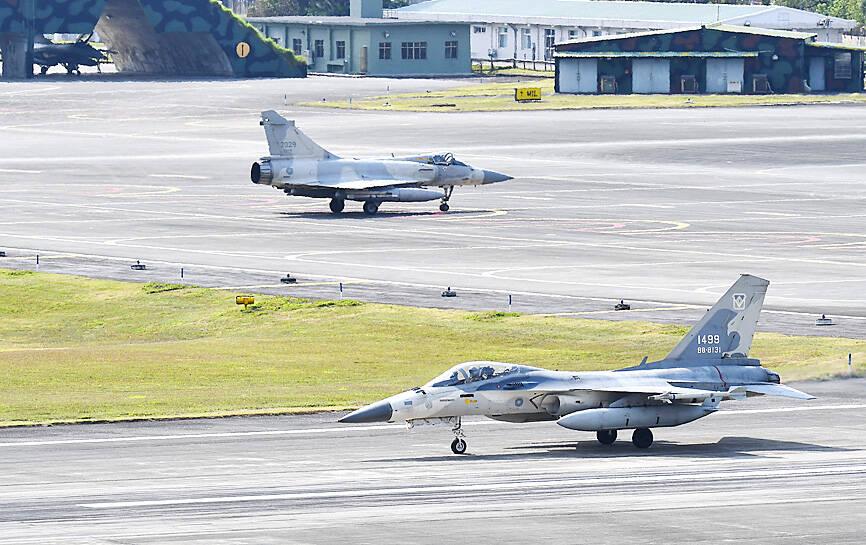Taiwan would likely be targeted by Chinese precision missile strikes in the event of a war and should disperse its military assets to prevent their destruction, Institute for National Policy Research senior consultant Chen Wen-jia (陳文甲) said yesterday.
Military units could be “hidden” among the public during peacetime and deployed to the field in the event of a conflict, Chen said.
The military could use mountainous areas, bridges, culverts, factories and underground facilities to hide its assets.

Photo: Yu Tai-lang, Taipei Times
The navy can disperse its assets along the east coast and store ammunition on civilian ships, he added.
The air force could hide its jets inside hangars carved into the mountains in eastern Taiwan, or fly them to the Philippines to prevent their loss, Chen said.
Minister of National Defense Chiu Kuo-cheng (邱國正) during a report to the Legislative Yuan on May 25 said that if war were to break out with China, there would be no front or rear, and all units would have to preserve their combat capabilities.
A joint article by Institute of National Defense and Security Research fellow Su Tzu-yun (蘇紫雲) and the Ministry of National Defense’s Department of Integrated Assessment Performance Appraisal Division Director Chang Ying-chung (張應中), published on the institute’s Bi-Weekly Defense Report on May 26, also addressed the issue.
The Chinese Communist Party (CCP) is investing heavily to boost its navy and air force, and is also stepping up the development of precision-strike capabilities, including ballistic missiles, cruise missiles and uncrewed platforms, the article said.
It said that China’s Dong-Feng 15C ballistic missile is capable of striking reinforced underground targets such as command centers, and fuel and munitions reserves.
Ukraine’s claim of successfully intercepting Russia’s Kh-47M2 Kinzhal with the Patriot missile system shows that missile-defense systems could provide adequate defense against hypersonic missiles, it said.
However, the systems are expensive and could leave critical military infrastructure exposed in the event of a saturation attack, it added.
The article suggested that missile defense systems should go hand-in-hand with passive defense systems, such as reinforced concrete, to mitigate threats posed by penetrating weapons.
The article suggested building new reinforced structures in tunnels, at least 100m underground in mountainous areas.

The manufacture of the remaining 28 M1A2T Abrams tanks Taiwan purchased from the US has recently been completed, and they are expected to be delivered within the next one to two months, a source said yesterday. The Ministry of National Defense is arranging cargo ships to transport the tanks to Taiwan as soon as possible, said the source, who is familiar with the matter. The estimated arrival time ranges from late this month to early next month, the source said. The 28 Abrams tanks make up the third and final batch of a total of 108 tanks, valued at about NT$40.5 billion

Two Taiwanese prosecutors were questioned by Chinese security personnel at their hotel during a trip to China’s Henan Province this month, the Mainland Affairs Council (MAC) said yesterday. The officers had personal information on the prosecutors, including “when they were assigned to their posts, their work locations and job titles,” MAC Deputy Minister and spokesman Liang Wen-chieh (梁文傑) said. On top of asking about their agencies and positions, the officers also questioned the prosecutors about the Cross-Strait Joint Crime-Fighting and Judicial Mutual Assistance Agreement, a pact that serves as the framework for Taiwan-China cooperation on combating crime and providing judicial assistance, Liang

A group from the Taiwanese Designers in Australia association yesterday represented Taiwan at the Midsumma Pride March in Melbourne. The march, held in the St. Kilda suburb, is the city’s largest LGBTQIA+ parade and the flagship event of the annual Midsumma Festival. It attracted more than 45,000 spectators who supported the 400 groups and 10,000 marchers that participated this year, the association said. Taiwanese Designers said they organized a team to march for Taiwan this year, joining politicians, government agencies, professionals and community organizations in showing support for LGBTQIA+ people and diverse communities. As the first country in Asia to legalize same-sex

MOTIVES QUESTIONED The PLA considers Xi’s policies toward Taiwan to be driven by personal considerations rather than military assessment, the Epoch Times reports Chinese President Xi Jinping’s (習近平) latest purge of the Chinese People’s Liberation Army (PLA) leadership might have been prompted by the military’s opposition to plans of invading Taiwan, the Epoch Times said. The Chinese military opposes waging war against Taiwan by a large consensus, putting it at odds with Xi’s vision, the Falun Gong-affiliated daily said in a report on Thursday, citing anonymous sources with insight into the PLA’s inner workings. The opposition is not the opinion of a few generals, but a widely shared view among the PLA cadre, the Epoch Times cited them as saying. “Chinese forces know full well that